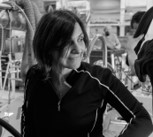
Anna Cipriani is an Associate Professor of Geochemistry and Volcanology in the Department of Chemical and Geological Sciences at the University of Modena and Reggio Emilia, where she teaches undergraduate and master students how chemical elements interact and behave on and within the Earth. Her main expertise is in the use of isotope and elemental geochemistry to investigate the processes of oceanic crust creation and evolution at mid ocean ridges, by examining mantle and crustal rocks outcropping at the ocean floor and in ophiolite sequences. She also uses Sr isotopes to date marine carbonates and fossils through the principles of Sr isotope stratigraphy. More recently, her work has broadened to include the application of geochemical analyses in archaeology, environmental and forensic studies. She is also actively participating in geo-wiki.org, a project that uses open source information and collection of crowdsourced spatial data to improve the interpretation of satellite imagery to better detect changes occurring on the Earth’s surface. In 2019, during an oceanographic expedition to the Equatorial Atlantic ocean, she dove to the bottom of the ocean with the French submersible Nautile to a depth of 5573 to explore and sample plate boundaries where new oceanic crust is created. You can read more about this here: https://5000undersea.unimore.it/
Email: anna.cipriani@unimore.it
Homepage UNIMORE: https://personale.unimore.it/rubrica/dettaglio/aciprian
Photo credits to Cédric Hamelin.

Federico Lugli is an Associate Professor of Geochemistry at the Department of Chemical and Geological Sciences of UNIMORE. His research focuses on the use of isotope geochemistry to unravel the interaction between human/animal and environment. In particular, he is interested in the use of strontium isotope analyses of teeth to decrypt mobility patterns and past migrations, but also in the use of stable (non-)traditional isotopes and elemental ratios to investigate trophic chains, diet histories and physiology. From a methodological point of view, he is involved in the development of novel methods for high precision and resolution laser ablation ICP mass spectrometry analyses of phosphates, carbonates and other geobiological matrices. Recently, he started working on proteomic analyses of bones and teeth by LC-MS/MS and MALDI-ToF, to unravel the taxonomy and the sex of humans and animals. Between 2023 and 2024, he led his MSCA-IF project AROUSE at Goethe University Frankfurt, investigating the hibernation (paleo)ecology of marmots using novel dental biomarkers, including high-spatial resolution trace element and isotopic analyses and dental histomorphometry. He is an Adjunct Researcher at the Institut für Geowissenschaften of the Goethe-Universität Frankfurt.
Email: federico.lugli@unimore.it
Homepage UNIMORE: https://personale.unimore.it/rubrica/dettaglio/fedlugli
Tommaso Giovanardi is an Associate Professor of Petrology in the Department of Chemical and Geological Sciences at 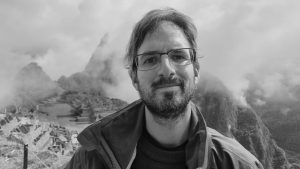 UNIMORE. His research centers on the geochemical and petrological investigation of melt-rock interactions, the evolution of mantle-derived magmas, and the formation of igneous complexes. He is particularly interested in the evolution of the sub-continental mantle, which he explores through the study of mantle xenoliths transported by magmatic activity and mantle sequences exposed during major geodynamic events. Dr. Giovanardi has a strong professional and personal connection to South America, where he has conducted extensive fieldwork over the years. He also spent three years as a postdoctoral researcher at the Universidade de São Paulo. His work emphasizes the use of in situ geochemical and isotopic techniques to decipher magmatic processes such as magma mixing, melt-rock interaction, and melt evolution. He also employs isotopic systems for geochronological purposes, linking the timing of magmatic events to broader geodynamic contexts. More recently, he has developed an interest in interdisciplinary applications of his expertise, expanding his research into the fields of archaeology and anthropology.
UNIMORE. His research centers on the geochemical and petrological investigation of melt-rock interactions, the evolution of mantle-derived magmas, and the formation of igneous complexes. He is particularly interested in the evolution of the sub-continental mantle, which he explores through the study of mantle xenoliths transported by magmatic activity and mantle sequences exposed during major geodynamic events. Dr. Giovanardi has a strong professional and personal connection to South America, where he has conducted extensive fieldwork over the years. He also spent three years as a postdoctoral researcher at the Universidade de São Paulo. His work emphasizes the use of in situ geochemical and isotopic techniques to decipher magmatic processes such as magma mixing, melt-rock interaction, and melt evolution. He also employs isotopic systems for geochronological purposes, linking the timing of magmatic events to broader geodynamic contexts. More recently, he has developed an interest in interdisciplinary applications of his expertise, expanding his research into the fields of archaeology and anthropology.
Email: tommaso.giovanardi@unimore.it
Homepage UNIMORE: https://personale.unimore.it/rubrica/dettaglio/giovanardi
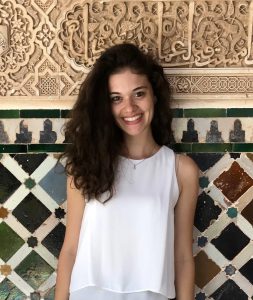 Elena Armaroli is a post-doctoral researcher at the Department of Chemical and Geological Sciences of the University of Modena and Reggio Emilia. Her research focuses on isotope analysis of archaeological fauna remains by MC-ICPMS and IRMS. Through the application of strontium, oxygen and carbon isotope analyses, she studies mobility and migration patterns, diet and paleoenvironment. Recently, she started performing serial sampling and high-spatial resolution LA-(MC-)ICPMS analyses of faunal tooth enamel to study the isotopic variations at (sub)seasonal level. The main goal of her research is to apply these state-of-the-art methodologies – from material sampling to mass spectrometry analysis – to geographically and temporally distant archaeological contexts in Eurasia.
Elena Armaroli is a post-doctoral researcher at the Department of Chemical and Geological Sciences of the University of Modena and Reggio Emilia. Her research focuses on isotope analysis of archaeological fauna remains by MC-ICPMS and IRMS. Through the application of strontium, oxygen and carbon isotope analyses, she studies mobility and migration patterns, diet and paleoenvironment. Recently, she started performing serial sampling and high-spatial resolution LA-(MC-)ICPMS analyses of faunal tooth enamel to study the isotopic variations at (sub)seasonal level. The main goal of her research is to apply these state-of-the-art methodologies – from material sampling to mass spectrometry analysis – to geographically and temporally distant archaeological contexts in Eurasia.
Email: elena.armaroli@unimore.it
Maria De Falco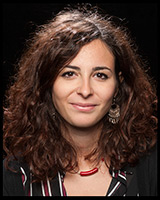 is a post-doctoral fellow at the Department of Chemical and Geological Sciences of the University of Modena and Reggio Emilia. She is specialised in archaeometric analyses on archaeological materials (petrography in thin section microscopy, XRD, XRF, ICP-MS and SEM-EDS) and in the study of Italian pre-protohistoric pottery with a focus on technology and productive processes. She particularly developed these skills during her PhD project at Durham University (UK) focused on Copper Age ceramic production from Southern Italy and her work at the Durham Archaeomaterial Research Centre. For her current research project (CAST) she is investigating metalworking ceramic and stone tools from Bronze Age contexts in Northern Italy through advanced archaeometric analyses to unravel the mechanisms and chaîne opératoire of metal circulation and production during the Bronze Age. She has been member of several archaeological excavations in Italy and abroad, both research and commercial, and is specialised also in digital technologies applied to archaeology (photogrammetry, 3d scanning and 3d printing).
is a post-doctoral fellow at the Department of Chemical and Geological Sciences of the University of Modena and Reggio Emilia. She is specialised in archaeometric analyses on archaeological materials (petrography in thin section microscopy, XRD, XRF, ICP-MS and SEM-EDS) and in the study of Italian pre-protohistoric pottery with a focus on technology and productive processes. She particularly developed these skills during her PhD project at Durham University (UK) focused on Copper Age ceramic production from Southern Italy and her work at the Durham Archaeomaterial Research Centre. For her current research project (CAST) she is investigating metalworking ceramic and stone tools from Bronze Age contexts in Northern Italy through advanced archaeometric analyses to unravel the mechanisms and chaîne opératoire of metal circulation and production during the Bronze Age. She has been member of several archaeological excavations in Italy and abroad, both research and commercial, and is specialised also in digital technologies applied to archaeology (photogrammetry, 3d scanning and 3d printing).
Email: maria.defalco@unimore.it
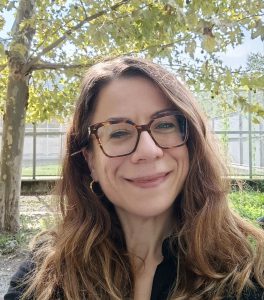
Sara Bernardini is a post-doctoral fellow at the Department of Cultural Heritage of the University of Bologna. Her research focuses on multi-isotopes analyses of Italian prehistoric human groups. After graduating in Archaeology at Sapienza University of Rome, she deepened her knowledge of stable isotope analysis protocols through a co-joint PhD in Prehistory between LAMPEA (CNRS UMR 7269, Aix-Marseille Universitè) and the Department of Environmental Biology of Sapienza University of Rome. She applies stable carbon, nitrogen and sulphur isotopes analysis on archaeological bone and dentine collagen to explore the social, economic and cultural dynamics of past human groups. Recently, she started employing multi-isotope analyses to reconstruct life histories by tooth sequential sampling. During her current position, she is being trained to perform trace element and strontium isotope analyses by LA-ICPMS and MC-ICPMS of bone and teeth at the Department of Chemical and Geological Sciences of the University of Modena and Reggio Emilia. These methodologies are applied to determine migratory patterns and landscape use by humans and animals from the archaeological contexts in study by the Laboratory of Osteoarchaeology and Paleoanthropology of the University of Bologna.
Email: sara.bernardini8@unibo.it; sara.bernardini@unimore.it
